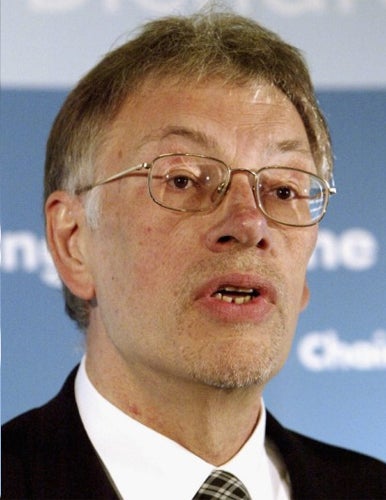School protection register is flawed
...says man whose work paved the way for new vetting procedures for adults working with children. Now the Soham inquiry head wants the Government to rethink parts of its anti-paedophile register

Your support helps us to tell the story
From reproductive rights to climate change to Big Tech, The Independent is on the ground when the story is developing. Whether it's investigating the financials of Elon Musk's pro-Trump PAC or producing our latest documentary, 'The A Word', which shines a light on the American women fighting for reproductive rights, we know how important it is to parse out the facts from the messaging.
At such a critical moment in US history, we need reporters on the ground. Your donation allows us to keep sending journalists to speak to both sides of the story.
The Independent is trusted by Americans across the entire political spectrum. And unlike many other quality news outlets, we choose not to lock Americans out of our reporting and analysis with paywalls. We believe quality journalism should be available to everyone, paid for by those who can afford it.
Your support makes all the difference.The man whose inquiry led to new vetting procedures for adults working with children today calls on the Government to rethink parts of its controversial anti-paedophile register.
Sir Michael Bichard, who led the inquiry into child protection following the murders of Holly Wells and Jessica Chapman in 2002, said some people would be caught up in the Vetting and Barring Scheme unnecessarily.
He said he had taken his concerns to Sir Roger Singleton, the chairman of the Independent Safeguarding Authority which is responsible for assessing who should be included on the database.
Sir Michael's comments come after The Independent published the concerns of a group of respected British children's authors and illustrators, who said they intended to stop visiting schools in protest at having to register with the scheme. In an interview yesterday, Sir Michael said the idea that people like actors, authors or entertainers, who only occasionally visit a school, should register with the scheme should be reconsidered.
"If you visit one school in January, and then don't visit that school again, but visit another school in February and another in March, is that frequent or intensive? I think that's something which might merit reconsideration," Sir Michael said. "Based on the discussions and conversations I've had, clearly there is an issue."
Under the scheme, which comes into force in November next year and carries a one-off £64 registration fee, "frequent contact" is defined as giving care, supervision, teaching or training to children once a month or more.
Sir Michael said there were a number of issues with the scheme which "need to be looked at again" and that "there will always be situations where you could argue that the line has been drawn in the wrong place".
The Government estimates that 11.3 million people – almost 20 per cent of the population – will have to register within five years. Sir Michael said that the figure was "astonishing" and "surprising" but was irrelevant as long as children were protected. In 2004, his report into child protection made recommendations including that a registration scheme be introduced for those wishing to work with children or vulnerable adults.
Yesterday, he said the system he had examined in 2004 had been "a mess" and he believed the UK was moving towards a "much better" scheme under which tutors, sports coaches and other people with access to children would have to be registered. But he warned: "What I didn't want was a disproportionate response. I made it very clear that I didn't want parents to have to check relatives before they could put their children in their care for babysitting and things like that.
"We must have proportionate arrangements. We mustn't over-react."
Under the scheme, parents who help on school trips or host foreign exchange students will have to join the database. The Home Office confirmed yesterday that if parents asked a relative or friend to look after their children, those carers would not have to register as it would be deemed a "personal arrangement".
A small relaxation of the rules would exempt thousands of people like the authors, who only visit schools occasionally, from joining the database.
While he appeared to endorse such a change, Sir Michael said the authors' reaction had been "disproportionate" and that he did not think that having to register on the scheme implied guilt.
"I don't have a lot of sympathy for people who say that just because they have to go through a checking process, somehow it's being implied that they are a child molester," he said.
"I don't think Roger Federer complains that because he has to expose himself to drug-testing, he's being accused of being a cheat – I think he accepts that as part of the responsibility of playing top-class tennis."
If someone fails to register on the scheme or works with children despite being barred, they could face a £5,000 fine. Employers who fail to check a candidate's status face prosecution.
A Home Office spokesman said: "The new Vetting and Barring Scheme means every individual working in a field that requires more than a tiny amount of contact with children and/or vulnerable adults will have to be vetted. We believe this is a common sense approach and what the public would rightly expect."
Join our commenting forum
Join thought-provoking conversations, follow other Independent readers and see their replies
Comments